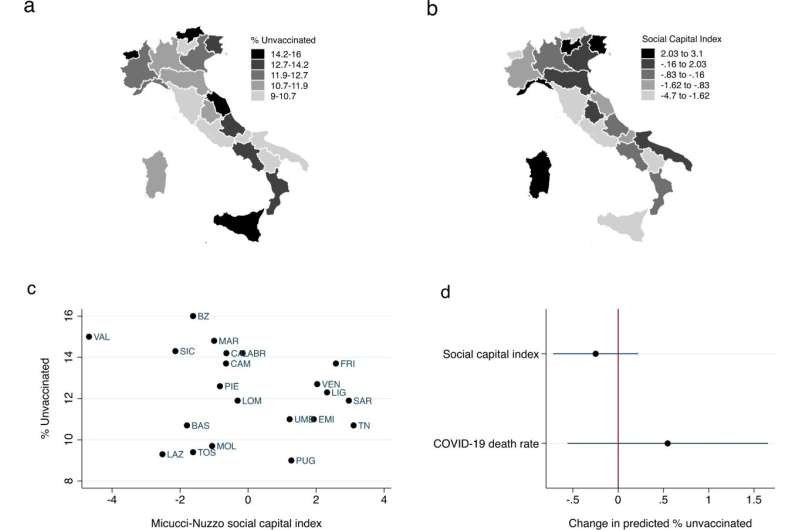This article has been reviewed according to Science X's editorial process and policies. Editors have highlighted the following attributes while ensuring the content's credibility:
fact-checked
trusted source
proofread
Vaccine campaign research highlights the power of individual self-interest

People who refused to get vaccinated against COVID-19 had low levels of social trust, weak attachments to the rule of law, and were less willing to honor collective commitments to the greater good, according to Cornell research published April 22 in npj Vaccines.
Researchers Sarah Kreps and Douglas Kriner surveyed residents of Italy who went unvaccinated, despite strong government policies and penalties. Previous research on vaccine holdouts had touched on fears about side effects and other health issues and concluded the best strategy to change minds would have been to emphasize the benefit to community and society.
Based on the survey results, Kreps and Kriner reached a different conclusion. Skepticism of government and collective commitments motivated many vaccination holdouts.
"We found strong evidence the unvaccinated may respond more to self-interest arguments about the personal benefits that come from vaccination," Kreps said. "They are less likely to support any collective commitments, even in areas unrelated to COVID. For example, they didn't see any moral imperative to aid Ukraine even though we administered our survey right after the invasion and they were much less likely to say Italy should aid a NATO ally if attacked by Russia."
Kreps is the John L. Wetherill Professor in the Department of Government in the College of Arts and Sciences (A&S) and director of the Cornell Tech Policy Institute in the Cornell Jeb E. Brooks School of Public Policy. Kriner is the Clinton Rossiter Professor in American Institutions in the Department of Government (A&S) and professor in the Brooks School.
Their research focused on Italy because, in early 2021, it had some of the most stringent policies to incentivize vaccination in the world. Without a vaccine card, you couldn't drink go to work, ride a bus or sip coffee in a café. Despite those rules, about 10% of Italians didn't get vaccinated. Kreps and Kriner surveyed them to develop insight that could help authorities respond to the next pandemic or another emergency requiring collective action.
One key finding is that the cues sent by political leaders make a big difference in a crisis. There are three primary conservative political parties in Italy. "So, if conservatives are just more likely to resist vaccination, then all three parties should have high rates of unvaccinated but that's not what we found," Kriner said. Two of the parties had leaders who openly criticized policies to incentivize and mandate vaccination (Lega and Fratelli d'Italia); one had leaders who supported these policies (Forza Italia).
Forza Italia supporters are almost all vaccinated, with rates virtually the same as parties favored by liberals. While Lega and Fratelli d'Italia supporters are much more likely to be unvaccinated.
"This strongly suggests that party leaders and other elites can have a major influence on followers who prioritize self-interest and get them to comply with policies that benefit all of society," Kriner said. "Consensus among leaders in a health crisis or any other crisis matters, and we saw in the U.S. and in Italy what happens without it."
More information: Sarah E. Kreps et al, Resistance to COVID-19 vaccination and the social contract: evidence from Italy, npj Vaccines (2023). DOI: 10.1038/s41541-023-00660-8



















